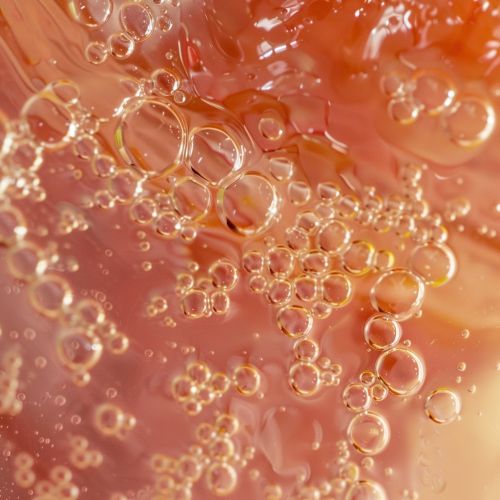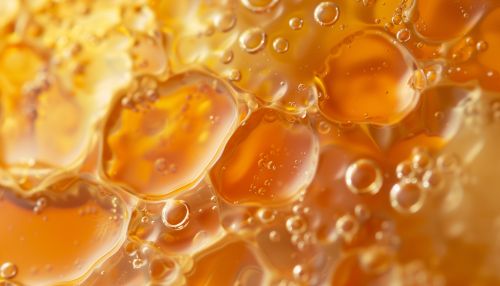Pancreatic juice
Overview
Pancreatic juice is a liquid secreted by the pancreas, which contains a variety of enzymes, including trypsinogen, chymotrypsinogen, elastase, carboxypeptidase, pancreatic lipase, nucleases and amylase. These enzymes play a crucial role in digestion, helping to break down the food in the small intestine.


Composition of Pancreatic Juice
The pancreatic juice is an alkaline secretion produced by the pancreas, which contains water, electrolytes, and a variety of enzymes. These enzymes are responsible for breaking down proteins, fats, and carbohydrates in the food we eat.
Enzymes
The enzymes found in pancreatic juice include:
- Trypsinogen and Chymotrypsinogen: These are proteolytic enzymes, which are responsible for breaking down proteins into their constituent amino acids. Trypsinogen is activated to trypsin by the enzyme enterokinase, which is found in the intestinal mucosa. Once activated, trypsin can then activate chymotrypsinogen to chymotrypsin.
- Elastase: This enzyme breaks down elastin, a protein found in connective tissue.
- Carboxypeptidase: This enzyme hydrolyzes the carboxyl-terminal peptide bond of a protein or peptide.
- Pancreatic Lipase: This is the main fat-digesting enzyme. It breaks down triglycerides into fatty acids and monoglycerides.
- Nucleases: These enzymes break down nucleic acids into nucleotides.
- Amylase: This enzyme breaks down carbohydrates into simple sugars.
Electrolytes
The electrolytes found in pancreatic juice include bicarbonate and chloride ions. Bicarbonate ions help to neutralize the acidity of the chyme (partially digested food) coming from the stomach, creating an alkaline environment in the small intestine. This is important because the enzymes in pancreatic juice function optimally in an alkaline environment.
Secretion of Pancreatic Juice
The secretion of pancreatic juice is regulated by both hormonal and neural mechanisms.
Hormonal Regulation
The main hormones involved in the regulation of pancreatic juice secretion are secretin and cholecystokinin (CCK).
- Secretin: This hormone is released from the S cells of the duodenum in response to the acidic chyme coming from the stomach. Secretin stimulates the pancreas to secrete a bicarbonate-rich fluid, which helps to neutralize the acidity of the chyme.
- Cholecystokinin (CCK): This hormone is released from the I cells of the duodenum in response to the presence of fats and proteins in the chyme. CCK stimulates the pancreas to secrete enzyme-rich pancreatic juice.
Neural Regulation
The secretion of pancreatic juice is also regulated by the autonomic nervous system. The parasympathetic nervous system, through the vagus nerve, stimulates the secretion of pancreatic juice. On the other hand, the sympathetic nervous system inhibits the secretion of pancreatic juice.
Function of Pancreatic Juice
The main function of pancreatic juice is to aid in digestion. The enzymes in pancreatic juice help to break down proteins, fats, and carbohydrates in the food we eat, making it easier for the body to absorb nutrients.
In addition, the bicarbonate ions in pancreatic juice help to neutralize the acidity of the chyme coming from the stomach, creating an alkaline environment in the small intestine. This is important because the enzymes in pancreatic juice function optimally in an alkaline environment.
Clinical Significance
Abnormalities in the production or secretion of pancreatic juice can lead to a variety of health problems.
- Pancreatitis: This is an inflammation of the pancreas, which can be caused by excessive alcohol consumption, gallstones, or certain medications. In pancreatitis, the enzymes in pancreatic juice can become activated within the pancreas itself, leading to damage and inflammation.
- Cystic Fibrosis: This is a genetic disorder that affects the secretory glands, including the pancreas. In cystic fibrosis, the pancreatic juice becomes thick and sticky, which can block the pancreatic ducts and lead to malnutrition and pancreatitis.
- Pancreatic Cancer: This is a type of cancer that starts in the pancreas. In some cases, pancreatic cancer can block the pancreatic ducts, leading to a decrease in the secretion of pancreatic juice and resulting in malabsorption and weight loss.
